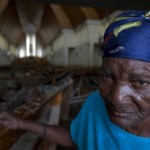Forest-Dependent Communities Lobby for End of REDD+
By Kristin Palitza
IPS
DURBAN, South Africa – Organisations working with indigenous peoples living in forests say the United Nations programme on Reducing Emissions from Deforestation and Forest Degradation in Developing Countries (REDD+) is just another way for big corporates to reap huge profits.
REDD+ has been touted as a global scheme to conserve forests, enhance carbon stocks and support sustainable forest management.
“It is a system where you pour a lot of money into forests that will attract powerful international investors who will make big profits,”
warned Simone Lovera, managing director of the Global Forest Coalition, a worldwide network of more than 50 non-governmental organisations and Indigenous Peoples’ Organisations based in Amsterdam, Netherlands. She spoke during the U.N. 17th Conference of the Parties (COP 17), which is taking place in Durban, South Africa, from Nov. 28 to Dec. 9.
Lovera does not contest that deforestation and forest degradation are key climate change culprits. Caused by agricultural expansion, conversion to pastureland, infrastructure development or destructive logging, they account for nearly 20 percent of global greenhouse gas emissions, according to the U.N., more than the entire global transportation sector and second only to the energy sector.
REDD+ is supposed to turn this around. Since it was started in 2005, the programme enables industrialised countries in the North to reward reductions of carbon emissions to nations in the South. It is basically a system of performance-based payments that are financed through global carbon markets. The U.N. predicts that finance for greenhouse gas emission reductions from REDD+ could reach up to 30 billion dollars per year.
The money is supposed to go towards pro-poor development, help conserve biodiversity and secure vital ecosystem services. But indigenous communities say this is not so.
It was big, international forestry businesses that ultimately benefited from the carbon deals, not the locals who have lived in and off the forests for many generations. Instead, locals are kicked off their land to make space for large monoculture plantations aimed at offsetting carbon emissions in the north.
Lovera said there are many risks inherent to REDD+ that indigenous communities are unable to address because they lack access to information and education, such as forced, non-transparent contracts and land grabbing. What forest-dependent communities need instead, she argued, are national public policies that support sustainable forest management.
Lovera said the U.N. promise of the scheme generating billions of dollars annually was “a big fairytale”, a way of green washing.
“There won’t be big carbon financing for REDD+. Carbon markets are collapsing. It’s a very risky scheme that is creating havoc all over the world,” she cautioned.
Her prediction is likely to be correct. A World Bank draft report, written for a G20 meeting in November and leaked to the British Guardian newspaper in September, confirmed the trouble global carbon markets are in.
“The value of transactions in the primary CDM market declined sharply in 2009 and further in 2010 … amid chronic uncertainties about future mitigation targets and market mechanisms after 2012,”
the World Bank stated.
In the meantime, the U.N. continues to pump large amounts of finance into REDD+. Last month, for example, Nigeria’s national REDD+ programme received four million dollars in funding, which the U.N. says brought total funding in 14 countries worldwide to nearly 60 million dollars. The funds are aimed at increasing the capacity of national governments to implement carbon-saving strategies together with local groups, such as indigenous peoples and other forest-dependent communities.
“The U.N.-REDD programme’s support is invaluable because climate change is a global problem and the issues of REDD+, sustainable forest management and sustainable livelihoods cannot be handled by the country alone,”
said Salisu Dahiru, national coordinator for REDD+ in Nigeria.
But organisations working with forest-dependent communities say the benefits for local people are minimal.
“We say very clearly ‘no’ to REDD+. Under it, people are being expelled from nature so that big industries can profit from carbon storage,”
argued Winnie Overbeek, the international coordinator of the World Rainforest Movement, a non-governmental organisation based in Montevideo, Uruguay.
In Uganda, for example, a case was documented where 22,000 people were violently evicted from the Mubende and Kiboga districts earlier this year to make way for the United Kingdom-based New Forests Company to plant trees, to earn carbon credits and ultimately to sell timber. Similar incidents happened to indigenous peoples all over the world, said Overbeek.
“REDD+ is about making more profit, continuing pollution and disrespecting the rights of forest people all over the world. It’s about land grabbing,” he warned.
“It’s time to stop thinking about REDD+ and start protecting local populations and their land rights.”
Marlon Santi, a member of the Quichua indigenous community that lives in the Amazon Region of Ecuador, said he has experienced first-hand how REDD+ took away people’s livelihoods. The scheme has led to mega forestry projects that exist to the detriment of local people.
“Forests have become a negotiating space to make money. They are used as business opportunities. That’s unacceptable to us,” said Santi.
“REDD+ projects are hypocritical. We need real political solutions that benefit everyone.”
He hoped the negotiators at this year’s COP 17 will grant an open ear to his people’s needs.
Source: IPS








Comments
Forest-Dependent Communities Lobby for End of REDD+ — No Comments